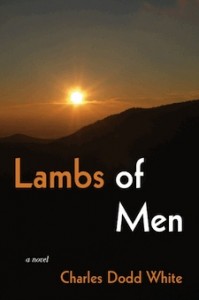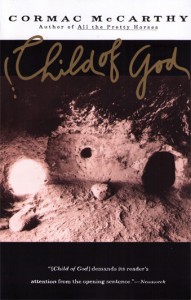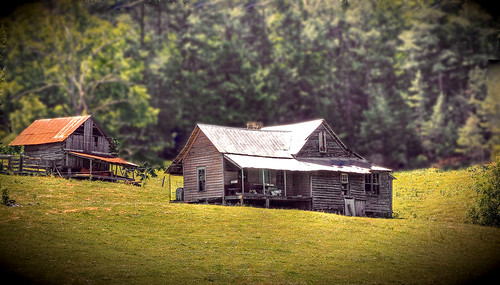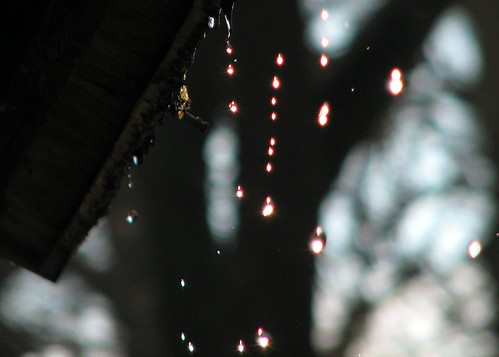 Charles Dodd White‘s debut novel, Lambs of Men (Casperian, Nov. 2010), unfolds in the Appalachian mountains of North Carolina immediately following World War I. After serving in the trenches of France, Hiram Tobit returns to the hills as a Marine Corps recruiter. Hiram’s homecoming dredges up an unhappy past—the last person he wants to see awaits him, the sole remaining member of his family: his father, Sloane. The alcoholic Sloane accidentally shot Hiram’s brother, Kite, years earlier. Following on the heels of this horrible event, Hiram’s mother, Nara, committed suicide during Hiram’s tour of duty. Naturally, Hiram blames his father for these losses, and their feud fuels the novel.
Charles Dodd White‘s debut novel, Lambs of Men (Casperian, Nov. 2010), unfolds in the Appalachian mountains of North Carolina immediately following World War I. After serving in the trenches of France, Hiram Tobit returns to the hills as a Marine Corps recruiter. Hiram’s homecoming dredges up an unhappy past—the last person he wants to see awaits him, the sole remaining member of his family: his father, Sloane. The alcoholic Sloane accidentally shot Hiram’s brother, Kite, years earlier. Following on the heels of this horrible event, Hiram’s mother, Nara, committed suicide during Hiram’s tour of duty. Naturally, Hiram blames his father for these losses, and their feud fuels the novel.
Hiram Tobit harbors interior wounds, hurts inflicted by the savagery of war and the brutality of his life in the mountains. The father/son conflict is as old as Oedipus, but the particulars and the passion of this tough and tender relationship still hold an unrelenting power, especially when coupled with the vivid details of place and character that White draws throughout the novel. Circumstance damages every son in a different way; every father possesses his own hidden story. White plumbs the depths of these archetypes with delicate and masterful skill, rendering both of these hard-edged mountain men with pity and understanding.
White’s style evokes Cormac McCarthy, perhaps because the only way to write effectively about extreme violence is to break each moment down into its most elemental parts. By meticulously describing the outer movements of both Sloane and Hiram, White reveals their echoing inner emotions. White’s writing is beautiful, luminescent, infused by that Southern cadence that belies an ancient, earthy wisdom.
When Hiram attends his first church service in his home community, the benediction has this effect:
The words were so familiar to Hiram. The same his mother had spoken throughout his boyhood. The easy praise and the submission to his will. How those words worked at him now, though. All the faith and humility armies of men could summon up meant nothing when the heart of God turned hard. Hiram had listened to the screams of the dying in his name, whether it was in English or German. But his answer never varied, all human language apparently beyond his ken. Hiram turned his eyes up before the final Amen. He saw that others did, too.
 White begins the story with Hiram’s return, but does not reunite father and son immediately. By delaying the meeting, tension and suspense build as White unspools the reasons Hiram avoids his father. Violence has driven a wedge between them, yet also draws them together when a heinous act occurs in the midst of the small mountain community: a young girl gets pregnant, and her enraged father kidnaps her, swearing vengeance. The sheriff asks several upstanding men, including Hiram, for help:
White begins the story with Hiram’s return, but does not reunite father and son immediately. By delaying the meeting, tension and suspense build as White unspools the reasons Hiram avoids his father. Violence has driven a wedge between them, yet also draws them together when a heinous act occurs in the midst of the small mountain community: a young girl gets pregnant, and her enraged father kidnaps her, swearing vengeance. The sheriff asks several upstanding men, including Hiram, for help:
Old Man Vaughn. His youngest went and got herself in trouble with some boy. Seems he got tipped to the fact she’s carrying a bastard and like to have a fit. Said if she didn’t tell him who the daddy was, he was gonna cut the little rabbit right out of her belly. He’s gone and run off and took the girl with him according to the mama. Lit out with the girl last night cussing about how he was gonna show that damn child the price for lying about while she was under his roof. We’ve got a fair idea of where he’s heading and I need ever man who can ride and shoot so as to get that girl back before he proves himself a fool.
A posse forms to go after Vaughn, and this is where Sloane enters the frame. Vaughn and Sloane used to hunt together years ago, and Sloane offers the only means of locating the old shack they shared.
Until this point, the story has been told in third-person limited, Hiram’s point of view. Once White introduces Sloane, the reader gets another perspective, though still in third-person: the father, who carries his wife and son’s deaths upon his body like a heavy wool coat. When Hiram and Sloane finally meet, the drenched posse requires shelter as well as direction. They must ask Sloane for help. The tension White creates as Hiram approaches his old home is palpable:
Hiram got off his horse and went up to where the rain scattershot across the tin roof.
Sloane’s voice bit like a hatchet. “I guess I was expecting you.”
“How’s that?”
“I just knew, is all.” The old man turned his eyes out to the streaming dark beyond. “Who are they?”
“The law. Looking for a man that made a mess of things.”
Sloane nodded and spat over the far edge of the porch floorboards. “They’s plenty of that type around, I imagine.”
“You gonna put us up until this storm passes?”
He leaned the shotgun against the doorframe. “I guess I’d be a sumbitch not to … bring those boys on in for a smoke and a cup.”
Hiram turned to the horses.
“Hiram.”
“Yes, sir?”
“It’s been a long time coming home.”
Sharp and accurate as a surgeon’s scalpel, White captures the dialect of the region, at the same time exposing the nature of father and son’s relationship.
White pulls off one more major shift in point of view in Lambs of Men‘s last chapter–but the change startles and delights with the surprise it offers. Nara, wife and mother, ends the book with her story, a fascinating decision by the author. Both men meet in the body of this woman, wife and mother. Her death serves as the crux of their conflict.
Throughout Lambs of Men, White’s writing is lovely, but in the last chapter, it approaches the sublime:
The birds had whispered her name at daybreak, the moment when shade mated with sun and the world was born. She’d strained to listen, to see if there was any way it might have been a trick of her mind, but the longer she waited the greater the distance between hearing and knowing became, frightening her into wakefulness.
This brief novel has the emotional power of a quick dagger thrust–short and filled with great strength. White is a master storyteller, rendering his prose as elegant, effective and deliberate as poetry. An amazing debut.
Further Links & Resources:
– “The Sweet Sorrowful” from Necessary Fiction (2010)
– “Hawkins’s Boy” from [PANK] (2010)
– “Confederates” from Word Riot (2009)









